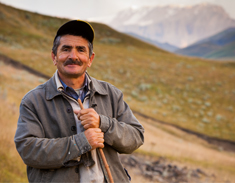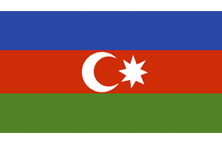Azerbaijan is bounded by the Caspian Sea to the east, Russia to the north, Georgia to the northwest, Armenia to the west and Iran to the south.
Population:
Approximately 9 million
Capital:
Baku, the largest city, is home to about 25% of the population.
Demographics:
91.60% Azerbaijanis, 2.02% Lezgians, 1.35% Armenians (almost all Armenians live in the break-away region of Nagorno-Karabakh), 1.34% Russians, 1.26% Talysh, 0.56% Avars, 0.43% Turks, 0.29% Tatars, 0.28% Tats, 0.24% Ukrainians, 0.14% Tsakhurs, 0.11% Georgians, 0.10% Jews, 0.07% Kurds, other 0.21%
Primary Language:
The official language is Azerbaijani, which is spoken by approximately 92% of the population as a mother tongue. There are a dozen other languages spoken natively in the country. Avar, Armenian, Budukh, Georgian, Juhuri, Khinalug, Kryts, Lezgian, Rutul, Talysh, Tat, Tsakhur, and Udi are all spoken by minorities.
Religion:
Around 95% of the population are Muslims. 85% of the Muslims are Shia Muslims and 15% Sunni Muslims. Other faiths are practiced by the country's various ethnic groups. Under article 48 of its Constitution, Azerbaijan is a secular state and ensures religious freedom. Of the nation's religious minorities, Christians are mostly Russian and Georgian Orthodox and Armenian Apostolic. In 2003, there were 250 Roman Catholics. Other Christian denominations as of 2002 include Lutherans, Baptists and Molokans. There are also Jewish, Bahá'í, Hare Krishna and Jehovah's Witnesses communities. There is the Hindu Fire Temple of Baku with an "old" structure which, according to travelers, has been a place of visit for Hindu priests for more than a millennium in Baku. The place is often "misrepresented as a Zoroastrian fire-temple" due to frequent association of "fire temple" with the Iranian religion of Zoroastrianism.
Economy:
After gaining independence in 1991, Azerbaijan became a member of the International Monetary Fund, the World Bank, the European Bank for Reconstruction and Development, the Islamic Development Bank and the Asian Development Bank. Azerbaijan has an economy that has completed its post-Soviet transition into a major oil based economy (with the completion of the Baku-Tbilisi-Ceyhan Pipeline), from one where the state played the major role.
Government:
The government of Azerbaijan is based on the separation of powers among the legislative, executive and judicial branches. The legislative power is held by the unicameral National Assembly and the Supreme National Assembly in the Nakhchivan Autonomous Republic. Parliamentary elections are held every five years, on the first Sunday of November. The executive power is held by the President, who is elected for a 5-year term by direct elections. The president is authorized to form the Cabinet, an inferior executive body, subordinated to him. The Cabinet of Azerbaijan consists primarily of the Prime Minister, his Deputies and Ministers. Although Azerbaijan has held several elections since regaining its independence and it has many of the formal institutions of democracy, it remains classified as "not free" (on border with "partly free") by Freedom House.
Most Importantly:
The people of Azerbaijan are BEAUTIFUL! Our attempt with this website is to show the beauty of the people of Azerbaijan and encourage you to purchase a print or book to serve it’s people.
Learn more:
Find out more interesting facts about Azerbaijan by visiting http://en.wikipedia.org/wiki/Azerbaijan

